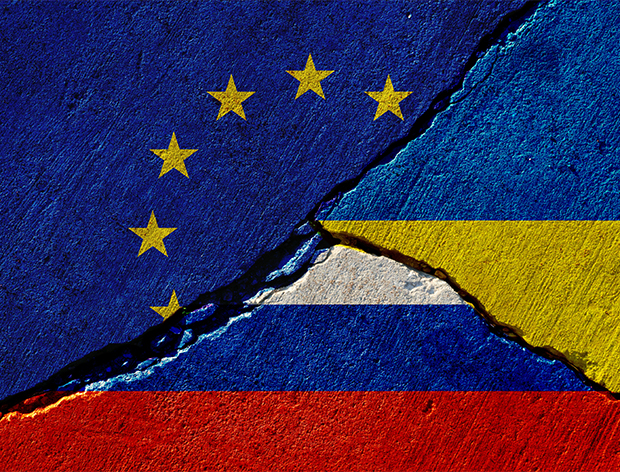European Union regulators have extended economic sanctions on Russia for six months and prolonged sanctions on Crimea and Sevastopol for a year, in response to what the EU says is the deliberate destabilisation of Ukraine.
The economic sanctions target specific sectors of the Russian economy, including financial services, energy and arms trade. An EU leaders’ summit on June 19 agreed to “proceed with the rollover of the sanctions” as it concluded Russia has again failed to implement the Minsk peace deals, signed in 2014-15.
The agreements were created to end fighting in Donbass, eastern Ukraine. Pro-Russian rebels in the region had also signed the deal.
A spokesperson for the European Council tells GTR that the evaluation of the implementation of the Minsk agreements has been done on a six-month basis and, as a consequence, sanctions have been renewed following the same timeline, with the next expiry date being January 31, 2021.
Ukraine’s foreign minister Dmytro Kuleba responded to the news, tweeting: “I welcome today’s political decision of EU leaders to extend economic sanctions against Russia for six more months. Since 2014, EU sanctions policy has helped deter Russian aggression against Ukraine. Sanctions send a clear signal: Russia needs to fully implement Minsk agreements.”
Under the economic sanctions, Russian banks and companies cannot access EU primary and secondary capital markets, the export and import of trade in arms is prohibited, the export of dual-use goods for military use to Russia is banned, and Russia’s access to certain sensitive technologies and services that can be used for oil production and exploration is curtailed.
Meanwhile, the sanctions on Crimea and Sevastopol, which are extended until June 23, 2021, prohibit the import of products originating in the regions into the EU as well as infrastructural or financial investments in Crimea or Sevastopol.
Located north of the Black Sea, the Crimean Peninsula was, according to the EU, illegally annexed by Russian authorities in 2014 and has since been governed as two Russian federal subjects – the Republic of Crimea and the federal city of Sevastopol.
The European Council has been dialling up sanctions against Russia since 2014 because of “attempts to deliberately undermine Ukraine’s territorial integrity and destabilise the country” by Russia.
As such, the new extension was somewhat expected. “It’s not really [significant], because those sanctions have been in place for quite some time,” says Aline Doussin, partner at Hogan Lovells. “It was pretty clear that the EU would extend these sanctions because obviously the situation on the ground is not considered by the EU as getting any better.”
EU states sanctions “shy”
Although it may come as no surprise that the EU has made the decision to renew economic sanctions on Russia, Doussin tells GTR that it will be “interesting” to see what happens now that the UK has left the EU as it has always been “quite vocal and influential on EU sanctions policy”.
“The UK and its regulator the Office of Financial Sanctions Implementation (OFSI), in conjunction with the Financial Conduct Authority (FCA), take a much more stringent approach to enforcement on sanctions obligations to the regulated sector, which includes, of course, financial institutions.
“Looking at this enforcement in the grand scheme of things on the UK side, it seems to demonstrate that there is a willingness to make sure that sanctions are being enforced. That is quite novel, because we see EU member states being more shy – there is less appetite or we don’t see as big enforcement cases outside of the UK.”
In March, OFSI issued a record £20.47mn fine to Standard Chartered for allegedly breaching restrictions on loans to Russian financial institutions. The regulator said the decision was taken after dozens of loans made by Standard Chartered to Denizbank – at the time almost wholly owned by Russia’s Sberbank – were deemed to be in breach of EU sanctions against Russia.
“We are seeing more cases coming out of the EU, but the financial sector has always been stronger in the UK,” Doussin says. “There were some rumours that potentially we might have a bit of a shift on the EU side with regards to sanctions on Russia. Potentially next year, the situation might be a bit different once the UK is completely out [of the EU]. Obviously, it is already out but it still has a foot in and so maybe then there will be more of a willingness to look at lifting this regime,” she says.
Given though that Germany is taking over the six-month rotating presidency of the European Council on July 1 from Croatia, it is highly unlikely anything will change in the near term, she adds.
German business has been in the middle of Russian sanction breaches before. In mid-2017, German industrial giant Siemens confirmed that four gas turbines had been moved against its will from Russia to Crimea, violating EU sanctions. Siemens insisted it was not aware the turbines were transported to Crimea and said it would press criminal charges against those responsible for the diversion. It also made the decision to sell its share in the Russian company Interautomatika, which offers products and services for power-plant instrumentation and control systems and had allegedly installed the turbines.







